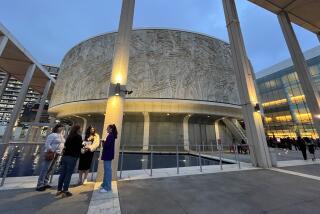‘For Sale’ Sign Up at Opera Site : The arts: Belgium’s Theatre Royal de la Monnaie is threatened by slashed government subsidies. Artists are rallying in support.
- Share via
BRUSSELS — Looking for a gift for that special someone who already has just about everything? How about one of Europe’s great opera houses?
A gigantic “For Sale” banner is draped over the Theatre Royal de la Monnaie, the magnificent 19th-Century theater where most of Belgium’s major opera and ballet performances are staged.
Actually, the Monnaie is not literally for sale, at least not yet. The banner is just one way of dramatizing the financial plight faced by the gilded, faintly Italian-style theater.
The Belgian government, confronted with a financial crisis that, in relative terms, dwarfs even the budget squeeze in the United States, is proposing to slash its subsidies to the theater by 20%, or about $6 million a year. That, according to Belgium’s artistic community, is enough to threaten the very existence of the Monnaie.
Bernard Foccroulle, the Monnaie’s new director, warns darkly of “a phase of intellectual and social death. The Monnaie does not claim other privileges than those of being able to live and create.”
Culture is not the only part of Belgium’s national budget that is facing hard times. The year-old government of Prime Minister Jean-Luc Dehaene is slashing everything from publicly subsidized preschools to health care for the elderly. And what is happening in Belgium is happening all over Western Europe. As in the United States, economic slumps have put European government budgets under tremendous strains.
Here the problem is aggravated by the European Community’s drive to scrap its national currencies, including the Belgian franc, in favor of a common European currency by 1999. Countries must get their budget deficits and inflation rates under control before they can switch to the single EC currency, and that has contributed to the budget-cutting fervor spreading through Western Europe.
Government subsidies now enjoyed by cultural institutions in Europe are enough to make an American’s mouth water. The Monnaie, for example, has been receiving about $31 million a year, or more than 80% of its annual $38-million budget, from the national government. (The city of Brussels cut off its contribution four years ago.)
That is not huge by European standards; subsidies for the Paris Opera and La Scala in Milan are more than twice as big. Cultural institutions in the United States, by contrast, receive much less. At the Los Angeles Philharmonic, for example, government support accounts for only about 3.5% of the annual budget.
Europe’s subsidies allow lower ticket prices, making musical performances accessible to a much broader range of the public. Tickets to Mozart’s “The Magic Flute,” which is now playing at the Monnaie, start at less than $8, compared to $19 for the cheapest seats for “Ariadne auf Naxos” at the Los Angeles Music Center Opera.
As the Belgian government squeezes its budget for the arts, everyone is suffering. Last year the symphony orchestra of the Belgian radio station RTBF was abolished.
“A serious crisis is now gripping the world of music in Brussels,” said RTBF director Philippe Dasnoy. “There is a fundamental problem of financing cultural activities in Belgium.”
The Belgian National Orchestra, which receives an extraordinary 93% of its budget in the form of public subsidies, is likewise in trouble. A recent report by the management consultants McKinsey & Co. recommended privatizing the orchestra--that is, turning it into a nonprofit institution financed largely by private grants.
But it is the Monnaie that, by virtue of its worldwide reputation, is responsible for most of the Angst in Belgium’s cultural community. Supporters nearly filled the theater’s 1,140 seats last month for a rally organized by Foccroulle to put pressure on the government not to slash his budget.
Some of the country’s leading cultural figures joined Foccroulle on the stage to demand that the Monnaie’s budget be restored. And Foccroulle distributed letters that he had solicited from all over Europe, and even the United States, in support of the Monnaie.
“The Monnaie, for all professionals, is a symbol of musical excellence and international glory,” said Pierre Boulez, composer and conductor of the Paris Symphony Orchestra.
“The Monnaie has long been noted for its interesting, innovative and extraordinary fare,” wrote Ardis Krainik, general director of the Chicago Lyric Opera. “I would hate to see the marvelous leadership position that the Monnaie has taken over the years be diminished by a lack of funds.”
The Monnaie owes some of its financial predicament to Gerard Mortier, its director until about a year ago. Mortier, now the widely acclaimed director of the Salzburg Festival, staged some fabulously elaborate productions, including the world premiere last year of “The Death of Klinghoffer,” produced by Peter Sellars, director of the Los Angeles Festival.
Those productions also cost fabulous sums of money, and the theater is now about $12 million in debt.
A spokesman for Belgium’s Culture Ministry said the Monnaie under Mortier consistently overshot its budget targets. In 1991, for example, the theater exceeded its $75,000 budget for cocktail parties by a whopping $175,000.
Foccroulle, the new director, has economized in some areas, but the Culture Ministry says he has spent $1.5 million more than was budgeted for sets.
“We can’t continue like that,” the spokesman said.
Foccroulle, for his part, says he can’t continue under the government’s budget. “Implementation of the government’s decisions,” he said, “would imply a reduction of activities, a more or less prolonged cessation of new opera productions . . . and an inevitable diminution of artistic quality.”
More to Read
The biggest entertainment stories
Get our big stories about Hollywood, film, television, music, arts, culture and more right in your inbox as soon as they publish.
You may occasionally receive promotional content from the Los Angeles Times.










